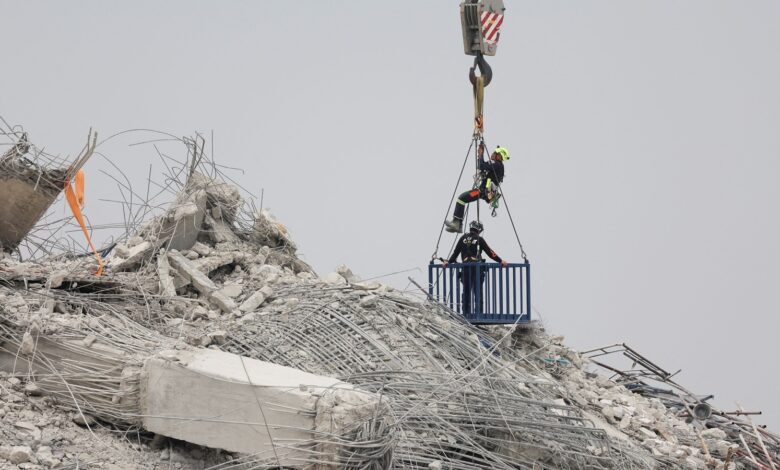Why did only one Bangkok skyscraper collapse during earthquake? Investigation reveals China connection | World News

A disaster waiting to happen? Corruption, negligence, and cost-cutting under inspection. It wasn’t just an earthquake that brought down the 30-storey skyscraper in Bangkok—it was a cocktail of alleged corruption, cost-cutting, and negligence. The under-construction government tower in the Thai capital, which crumbled following tremors from a 7.7-magnitude earthquake in Myanmar last week, is now at the centre of a scandal that could expose deep-rooted flaws in Thailand’s construction oversight. While other high-rises in Bangkok remained undamaged, this structure collapsed like a house of cards, raising questions about its design, materials, and the integrity of those behind the project.As investigations into the collapse intensified on Monday, Thai authorities detained four Chinese nationals for allegedly attempting to remove sensitive documents from the disaster site. According to the Thai news agency The Nation, the individuals were caught illegally entering the restricted area of the fallen State Audit Office (SAO) building and retrieving over 30 documents.
Police Major General Nopasin Poolswat confirmed the recovery of 32 files, including blueprints and other construction-related paperwork. One of the detainees, who held a valid work permit, claimed to be a project manager, while the others identified as subcontractors. They argued that the documents were important for the claims process. However, they were charged with violating safety regulations and released pending further investigation.
Story continues below this ad
Skyscraper’s collapse: construction failures
The 30-storey skyscraper, part of Thailand’s State Audit Office project, had been under construction for three years and was scheduled for completion in 2026. The $58 million project was a joint venture between Italian-Thai Development Plc and China Railway Number 10 (Thailand) Ltd, a subsidiary of China Railway Group, according to a report The Telegraph UK. Under Thai law, foreign ownership was limited at 49 per cent, with the remainder held Thai investors Sophon Meechai (40.80 per cent), Prachuab Sirikhet (10.20 per cent), and Manas Sri-anant (a minor stakeholder with three shares).
Following the collapse, Deputy Prime Miner Anutin Charnvirakul ordered an immediate investigation. “I’ve given them seven days to report back on what caused the building to fall,” he told The Telegraph.
Experts have raised concerns about possible construction flaws. Prof. Suchatchavee Suwansawas, a civil engineer and politician said, “You see all other buildings, even high-rise buildings under construction, they’re safe. So either the design was wrong or construction was wrong, but it’s too soon to reach conclusions,” news agency Reuters reported.
Corruption allegations and project delays
The collapsed skyscraper was already under inspection before the disaster. Mana Nimitmongkol, president of the Anti-Corruption Organisation of Thailand, revealed that the government had previously considered canceling the project due to severe delays and irregularities. Reuters reported that inspections highlighted worker shortages, project stagnation, and potential cost-cutting measures.Story continues below this ad
In January, the audit office even threatened to terminate the contract, with Deputy Auditor General Sutthipong Boonnithi confirming that only 30 per cent of the work had been completed at the time of the collapse.
Finances and use of sub-standard materials
Financial records show China Railway Number 10 (Thailand) Ltd reported a net loss of 199.66 million baht in 2023, despite generating revenue of 206.25 million baht. With expenses ballooning to 354.95 billion baht, financial instability may have pressured the firm into cost-cutting measures.
Concerns over substandard materials have also emerged. Thai Industry Miner Akanat Promphan revealed that officials are testing materials from the site. “Many factories using outdated equipment relocated from China have led to sub-standard steel,” he warned. Over the past six months, authorities have cracked down on seven such factories, seizing assets worth 360 million baht ($10 million), Reuters reported.
Public backlash and economic fallout
The collapse has ignited public outrage, with Prime Miner Paetongtarn Shinawatra ordering all agencies to conduct a thorough investigation. Meanwhile, China’s Ambassador to Thailand, Han Zhinqiang, has pledged full cooperation with the inquiry.Story continues below this ad
The financial impact has been severe. Italian-Thai Development Plc’s shares plummeted 30 per cent at the market’s opening on Monday, far exceeding the benchmark index drop of 1 per cent. Analysts warn that the incident could shake investor confidence in infrastructure projects involving Chinese firms.
Rescue operations continues
While authorities investigate, the immediate focus remains on rescue efforts. 76 people are still believed to be trapped under the rubble, with 11 fatalities confirmed so far. Anek Siripanichgorn, a board member of the Council of Engineers Thailand said that, “This was not a natural disaster. The collapse points to serious structural failures.”







